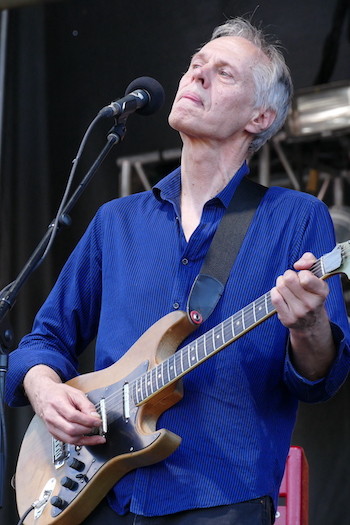Rock Remembrance: Tom Verlaine
By Paul Robicheau
Tom Verlaine will be most remembered for Marquee Moon, both the album and title track, which alone would be enough to seal any legacy.

Tom Verlaine at Sold Sound in 2017. Photo:Paul Robicheau.
Tom Verlaine stood tall as a guitar hero in a scene largely opposed to the concept, New York’s punk cauldron of the mid-’70s. In an era of rock guitarists heavy on blues-based trills and fuzztone, Verlaine conveyed the lean primitivism of punk, the improvisational jolt of jazz, and architectural precision of classical music in guitar flights of fancy, laced with brittle, ringing notes and quavering sustains.
Verlaine’s group Television was one of the first rock bands to herald the golden age of the legendary Bowery club CBGB, soon followed by the Ramones, Patti Smith Group, Blondie, and Talking Heads, whose David Byrne likely heard kinship in Verlaine’s oblique lyrics and nervy, adenoidal vocal stylings. Patti Smith — who was by Verlaine’s bedside when he died this week at age 73 — found a soul mate in a shy, literary-minded musician likewise inspired by French Symbolist poets.
In fact, the Delaware native (born Thomas Miller) fashioned his stage name after the poet Paul Verlaine. Classically trained on piano, he played sax in high school, drawn to the free-spirited jazz of John Coltrane and Albert Ayler but shifted to guitar after he heard the Rolling Stones’ “19th Nervous Breakdown” (Television later covered the Stones’ “Satisfaction” on tour).
Moving to New York, Verlaine started a band with two friends from high school, Richard Hell on bass and Billy Ficca on drums. With the addition of Richard Lloyd as a worthy guitar foil for Verlaine, they changed the group’s name to Television. After Fred Smith replaced Hell in 1975, Television self-released the single “Little Johnny Jewel.” Then, after two years of label wrangling (including failed demos with producer Brian Eno, who later helped supercharge Talking Heads and U2) came Television’s landmark debut Marquee Moon, which songwriter Verlaine co-produced with engineer Andy Johns.
The album’s first side in particular was a warning shot of perfection, from the teetering thump of “See No Evil” to the structural grandeur of its 10-minute title track “Marquee Moon,” where Verlaine intertwined with Lloyd to cap a nip-and-tuck dance of guitar leads both slippery and steely — and ultimately lacerating.
Similar to Lou Reed with the Velvet Underground before him, Verlaine didn’t sell many albums with Television but influenced countless post-punk, alternative, and indie-rock musicians with his against-the-grain guitar attack. The indie-rock spark was notably evident in the jangly lilt of “Days” from 1978’s Adventure, Television’s second and last album before an eponymous release marked a brief ’90s reunion.
U2’s the Edge, Echo & the Bunnymen’s Will Sergeant, Living Colour’s Vernon Reid, the Dream Syndicate’s Steve Wynn, and Wilco’s Nels Cline were among the guitarists paying respect to Verlaine on social media this week. Cline, in particular, evokes Verlaine’s sweeping, jazz-informed sting in his playing. Wilco nailed “Marquee Moon” during an all-covers set at its 2013 Solid Sound Festival in North Adams, then invited Television to play one of its infrequent post-millennial dates there in 2017 (a decade after Lloyd had quit, replaced by Jimmy Rip on second guitar).
Guitarists weren’t the only ones impacted by Verlaine. In response to his song “Always,” the Canadian pop group Alvvays recorded a tune called “Tom Verlaine” on its last album. And Michael Stipe, whose band R.E.M. covered “See No Evil,” praised Verlaine’s songs, lyrics and voice on his own social media post. “You introduced me to a world that flipped my life upside down,” Stipe wrote.
I saw Verlaine perform a handful of times, with Television, in a guest appearance with Patti Smith’s band, and as a solo artist after Television’s first breakup. He made several solo albums, including a eponymous 1979 debut (with “Kingdom Come,” which David Bowie covered on his 1980 Scary Monsters album), 1981’s broad Dreamtime (probably my favorite, led by the jagged “There’s a Reason”) and 1992’s noisy and impressionistic all-instrumental jaunt Warm and Cool.
Verlaine will nonetheless be most remembered for Marquee Moon, both the album and title track, which alone would be enough to seal any legacy.
Live set at the Tim Festival in Brazil, 2005 (“Marquee Moon” at 47:11 mark):
Paul Robicheau served more than 20 years as contributing editor for music at the Improper Bostonian in addition to writing and photography for the Boston Globe, Rolling Stone, and many other publications. He was also the founding arts editor of Boston Metro.
